Angela Bassett and what Oscar snubs had to do with it
- Oops!Something went wrong.Please try again later.
- Oops!Something went wrong.Please try again later.
- Oops!Something went wrong.Please try again later.
- Oops!Something went wrong.Please try again later.
The Best Blacktresses: 1990s — Bassett’s breakthrough role as Tina Turner in "What’s Love Got to Do With It" established her as the top Black actress of the decade, even as parts afterwards were rarely worthy of her talents.
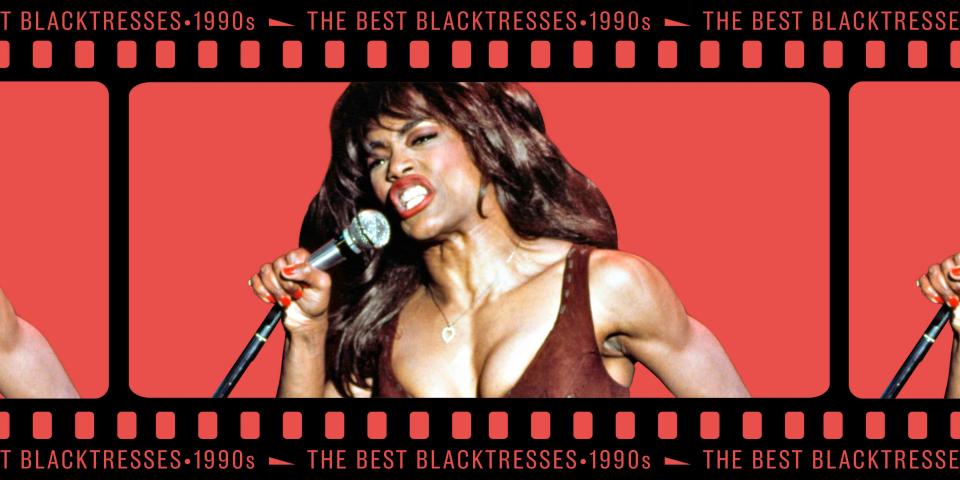
Everett Collection - Design: Alex Sandoval
The Best Blacktresses - The 1990s: Angela Bassett in 'What's Love Got to Do With It'The Best Blacktresses is a weekly, seven-part series dedicated to the 13 Black women and their 14 performances (shout-out to two-time nominee Viola Davis) nominated for Best Actress in a Leading Role in the Academy Awards’ nearly 100-year history.
By the time Whoopi Goldberg won her Best Supporting Actress Oscar in 1991, a number of Black actresses had begun to make names for themselves in Hollywood, among them Alfre Woodard, Lynn Whitfield, Vivica A. Fox, Jada Pinkett, Nia Long, Regina King, Robin Givens, Sheryl Lee Ralph, Jenifer Lewis, former Miss America Vanessa Williams, and fellow erstwhile pageant queen Halle Berry.
But with her breakthrough role in the 1993 biographical film What’s Love Got to Do With It, about the rise of Queen of Rock and Roll Tina Turner and her tumultuous marriage to Ike Turner, Angela Bassett established herself as the top Black actress of the ‘90s. And the only Black woman to garner a Best Actress in a Leading Role Oscar nomination in the decade — just as Goldberg had been in the previous one.
Progress can be frustratingly slow but since Goldberg's own breakthrough, more Black talent emerged in front of and behind the camera, even as their industry's gatekeepers remained overwhelmingly white. So opportunities for meaty leading roles were still few and far between. Consider the fact that after 1972’s Lady Sings the Blues starring Diana Ross, What’s Love Got to Do With It was the first major Hollywood biopic about a Black woman.
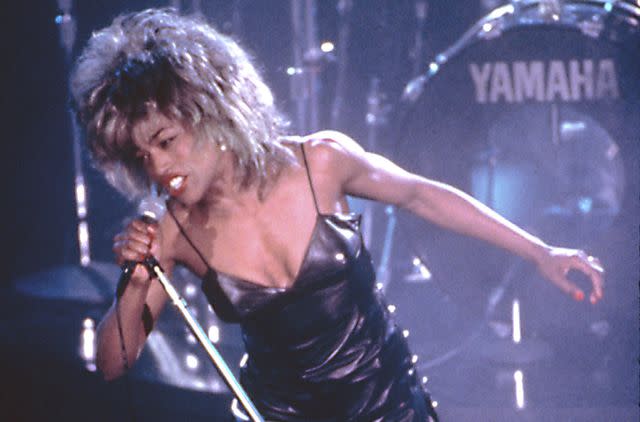
Everett Collection
Angela Bassett in 'What's Love Got to Do With It'Therefore, it was a big deal. Berry, Givens, and Whitney Houston were all considered for the role of Turner, but Bassett won out in the end thanks to a screen test in which she performed the signature tune “Proud Mary.” When Turner met Bassett for the first time, she gave the young actress a once-over and proclaimed, “She’s perfect!”
With a Masters degree from the Yale School of Drama, Bassett made her professional acting debut at age 27 in 1985 on a couple TV roles before landing a small part in the 1986 film F/X. Her first significant role came with 1991’s Boyz n the Hood, directed by John Singleton. Bassett referred to Singleton as her “little brother” on set and credited the then-22-year-old with giving her the break she needed.
“I’d been in L.A. for about three years and I was trying, trying, trying to do films,” Bassett said in 2016. “We talked, I auditioned, and he gave me a shot.”
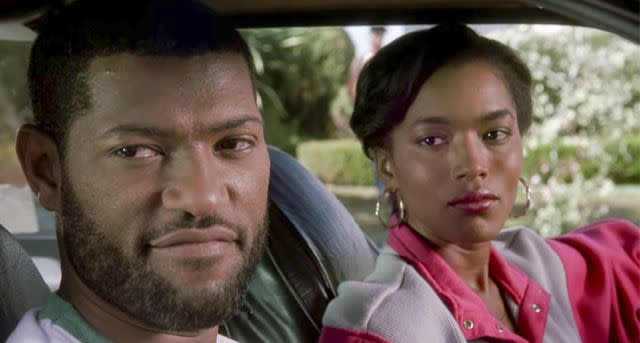
Columbia
Laurence Fishburne and Angela Bassett in 'Boyz n the Hood'With Boyz n the Hood, Singleton made Oscar history; in addition to his nomination for Best Original Screenplay, Singleton became, at 24, the youngest person and the first African American nominated for Best Director. The cast — which included Laurence Fishburne, Nia Long, Morris Chestnut, Ice Cube, and future Oscar-winners Cuba Gooding Jr and Regina King — though critically acclaimed, went unrecognized.
Just two years earlier Spike Lee’s landmark Do the Right Thing was snubbed by the Academy — a fact openly acknowledged by presenter Kim Bassinger — with only one nomination for Lee’s original screenplay. But the financial and cultural success of Do the Right Thing opened the door to Boyz n the Hood, in turn ushering in a golden age of Black filmmaking, of which Bassett would become its dynamic center.
In 1992, Bassett starred as Betty Shabazz opposite a career-best Denzel Washington in Lee’s epic Malcolm X. Washington was nominated for Best Actor, losing, rather controversially, to Al Pacino for Scent of a Woman. But aside from a nomination for Ruth E. Carter’s costumes, the film, Lee’s direction, and Bassett’s performance were all ignored by the Academy.
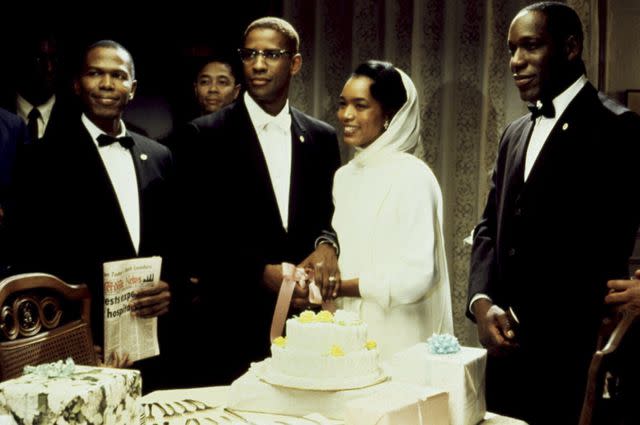
Everett Collection
Denzel Washington and Angela Bassett in 'Malcolm X'The same week of that film’s release, Bassett played Katherine Jackson in the popular TV miniseries The Jacksons: An American Dream, with her Boyz n the Hood costar Fishburne as family patriarch Joe Jackson. It was watched by nearly 40 million people. Bassett had momentum and What’s Love Got to Do With It took her to that rarified circle only five other Black actresses had reached before her: a Best Actress Oscar nomination.
Bassett worked tirelessly to do justice to Turner for the film, perfecting the legendary singer’s movements and mannerisms, down to where she took breaths when she sang and the length of a single “Oh.” Much was made of Bassett’s arms and admittedly impressive physique for the film, with more interest shown to her diet than her technique.
“You never mimicked me. Instead, you reached deep into your soul, found your inner Tina, and showed her to the world,” Turner wrote of Bassett for Time’s 100 Most Influential People in 2023, shortly before the rock icon's death at age 83.
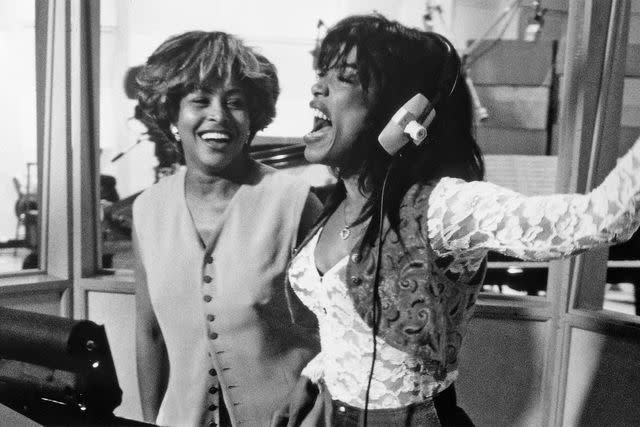
Like most biopics, What’s Love sags under the weight of rendering an entire life in a neat cinematic package, but Bassett holds the film mightily on her (jacked) shoulders, going from teenaged Anna Mae Bullock to the superstar half of Ike and Tina Turner to the phoenix Tina risen from the ashes of an abusive relationship to a stadium-packing global icon. It’s one of the great showbiz stories and one of the great showbiz movie performances.
At the 1994 Oscars ceremony, not a particularly memorable year, Bassett was up against Stockard Channing in Six Degrees of Separation, Emma Thompson in The Remains of the Day, Debra Winger in Shadowlands, and eventual winner Holly Hunter in The Piano. Fishburne was also up for Best Actor, the first time that two African Americans were nominated in those categories in the same year since Cicely Tyson and Paul Winfield for Sounder in 1973.
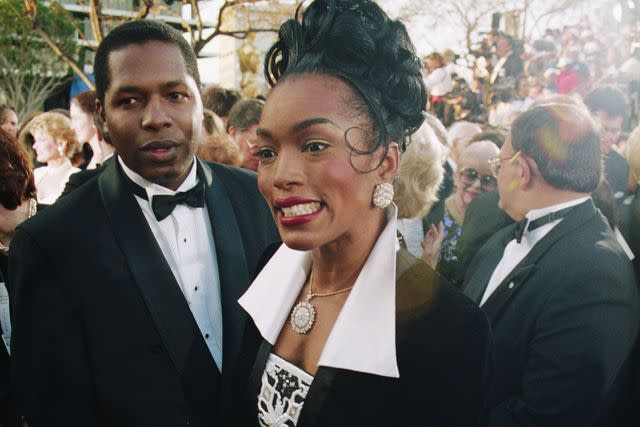
Steve Starr/CORBIS/Corbis via Getty Images
Angela Bassett and husband Courtney B. Vance at the 1994 Academy AwardsLike Tyson, Bassett’s nomination didn’t immediately translate into a career boost. She later admitted she didn’t know how to play the game, and one doubts she would have been very interested in playing that game at all. In a 2022 interview with Today, Bassett revealed that after her star turn in What’s Love, she didn’t receive a phone call for a gig for a year and a half.
"It was just the time,” Bassett said. “We had never seen a movie like this, where a Black woman was at the lead of the story. That was sort of new territory at that time.”
Each time a Black woman is nominated for Best Actress at the Oscars it’s new territory. Because it’s so rare. The performances and the characters they portray are always new territory because stories about Black women are rarely told and when they are told and told well, they’re treated like a novelty. Not a reflection of the vibrancy and skill of an underutilized and underrepresented community of artists. Which begs the question: When will it stop being new?
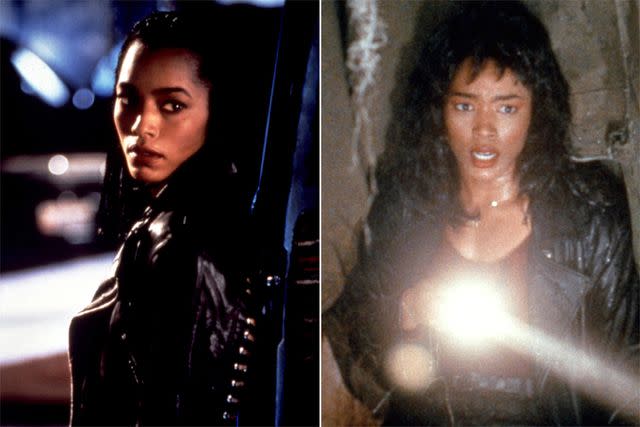
Everett Collection (2)
Angela Bassett in 'Strange Days' and 'Vampire in Brooklyn'While the Oscar win would’ve been great, historic, and deserved, Bassett’s career plugged along just fine without it for several years as she consistently garnered acclaim in a wide variety of films. In 1995, after that year and a half of phone silence, Bassett starred in the cult classics Strange Days by Kathryn Bigelow and Vampire in Brooklyn by Wes Craven, followed by the ‘90s touchstone Waiting to Exhale (to this day, a peerless soundtrack) about the cherished bonds between Black women.
Bassett was at the forefront of a widening representation of Black women, and thus Black life, in cinema. It was Bassett burning her cheating husband’s clothes and his BMW to the ground in Exhale, turning the Angry Black Woman trope into a moment of glorious self-actualization. It was Jada Pinkett, Queen Latifah, Vivica A. Fox, and Kimberly Elise robbing a bank in an attempt to claim a piece of the American pie for themselves in Set It Off. It was Fox kissing Will Smith in romantic silhouette as white couples had done for decades on celluloid, after he literally saved the world in Independence Day. It was a single, middle-aged Black professional getting her groove back with the help of BFF Whoopi Goldberg. It was Alfre Woodard, period.
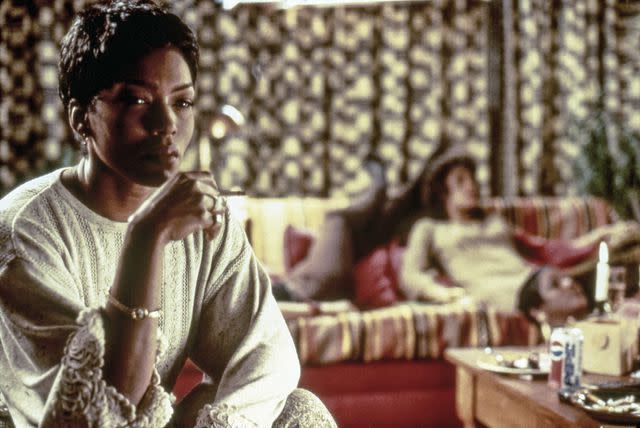
Everett Collection
Angela Bassett in 'Waiting to Exhale'Bassett, like Tyson, was very selective with what roles she chose for herself, the burden of representing an entire race passed down across generations. The roles started to dry up toward the end of the ‘90s but Bassett still turned down Monster’s Ball, about a widow and single mother who begins a relationship with a corrections officer who, unbeknownst to either of them, assisted in executing her husband.
The film featured an explicit, for the time, sex scene between the two leads, which played a part in Bassett’s decision to decline the role.
”I couldn’t do that because it’s such a stereotype about Black women and sexuality,” Bassett said after Berry won the Oscar for the role. ”Film is forever. It’s about putting something out there you can be proud of 10 years later. I mean, Meryl Streep won Oscars without all that.”
”I can’t and don’t begrudge Halle her success,” Bassett continued. ”It wasn’t the role for me, but I told her she’d win, and I told her to go get what was hers. Of course I want one, too. I would love to have an Oscar. But it has to be for something I can sleep with at night.”

Everett Collection
Angela Bassett and Whoopi Goldberg in 'How Stella Got Her Groove Back'Let’s be clear. Berry is a fine actress, but if Bassett had been in Monster’s Ball, the Academy would’ve sent that Oscar directly to her front doorstep. Overnight. But Bassett also had a point. Not so much about the sex, but about perpetuating Black stereotypes. Berry’s character is a widow, her convict husband having been executed, only to, spoiler alert, lose her only son. It's trauma overlaid with trauma, a Black woman victimized by an unfeeling world and unsympathetic society. It’s heartbreaking, but it’s also written by two white men and directed by a third. It’s fair to believe they would rely on stereotypes of Black women in writing a character so far removed from their own experiences.
But what of the Academy? For decades, Black women were nominated for Oscars for performances in which they were systematically broken down and/or suffered the competing plagues of Black life in America: poverty, drug abuse, violence, and exploitation. Bassett has appeared in those kinds of roles — Turner is repeatedly abused and sexually assaulted by her husband in What's Love, while Reva, the single mother from Boyz n the Hood, loses her son to gang violence.
However, Bassett also strived to portray different kinds of characters and maybe Monster’s Ball felt more like a step back than forward. The shame is Bassett’s career stalled for years, though she continued to regularly appear in films and television, not as a leading lady, which she had become, but almost as an accessory. Meanwhile, a generation of filmmakers who had grown up idolizing Bassett were more than ready and eager to give her the flowers Hollywood had denied her.
The last few years have seen Bassett rise to the level of recognition in her own industry befitting someone with her resume, talent, and resilience. She garnered Emmy nominations for playing Lena Waithe’s mom in Master of None and for A Black Lady Sketch Show episode literally entitled “Angela Bassett Is the Baddest Bitch.”
Nearly 30 years after her first Oscar nomination, Bassett was up for the prize again, this time for Best Supporting Actress for 2022's Black Panther: Wakanda Forever, the first time a performer had been nominated for a Marvel movie. When she lost to Jamie Lee Curtis, Bassett remained seated as the rest of the crowd rose to their feet. Was she being a bad sport? Or was she just tired? During her awards campaign, Bassett had learned to play the game and was every inch the good sport, expressing how grateful she was just to be nominated.
Perhaps she didn’t express enough gratitude. But the gratitude shouldn’t have been hers to give in the first place, but to receive. Understanding this, the following year, the Academy offered Bassett, clearly as a consolation prize, the Academy Honorary Award for her decades of delivering “transcendent performances that set new standards in acting."
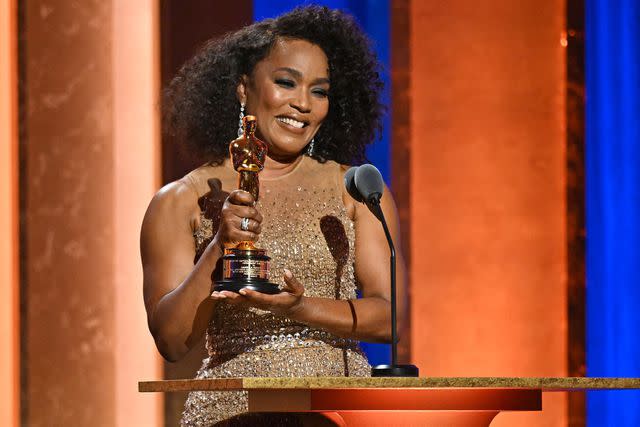
ROBYN BECK/AFP via Getty
Angela Bassett accepting her Academy Honorary AwardBig words. And a big honor, yet it doesn’t feel quite enough. An Honorary Oscar is great, but Angela Bassett regularly getting roles that warrant Oscar attention — or that are just worthy of her bad bitchery — would be better.
Next, we’ll explore what winning an Oscar actually does for the career of a Black actress.
Want more movie news? Sign up for Entertainment Weekly's free newsletter to get the latest trailers, celebrity interviews, film reviews, and more.
Related content:
Read the original article on Entertainment Weekly.

